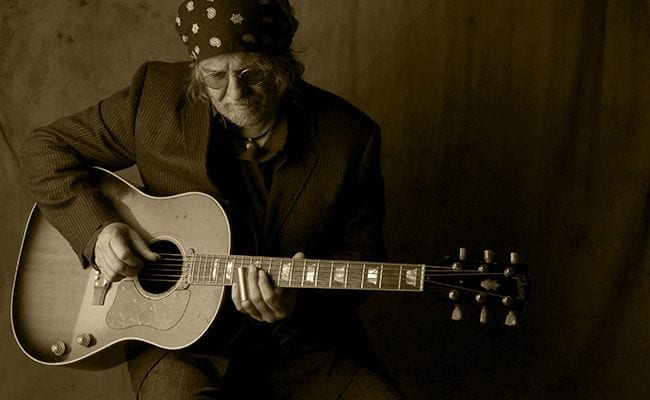
Ray Wylie Hubbard may seem to get more cantankerous as he gets older, but it’s just a pose. Sure he growls and spits out his lyrics and plays a nasty guitar. Hubbard may even complain loudly as if it hurts to sing authentically. Yet careful attention to his latest album, The Ruffian’s Misfortune, reveals he’s fairly content with his lot in life. And why shouldn’t he be? After decades of financial struggle and drug and alcohol addictions, he’s living clean with his son in his band and his wife as manager. He’s found the lord. His music has never been more popular. Things are good for the gruff and irritable fellow.
This can be problematic. Many of the cuts on his most recent album sound almost happy. It’s one thing to be bad—like the old Hubbard—and another thing to be “Bad on Fords”. Sure, he still sings about being disobedient; the vehicles he drives in the aforementioned song may be stolen, and such. But Hubbard refers to past glories more than present hijinks whether he’s down and out in Chicago (“Mr. Musslewhite’s Blues”) or just being a wild kid partying at the water (“Down By the River”). These songs bounce along when they would be better just being nasty.
Hell, he’s good-humored, politically correct, and even respectful on tunes such as “Chick Singer, Bad Ass Rockin’”, “Stone Blind Horses”, and “Barefoot in Heaven”. Now Hubbard is downright infectious. There’s nothing bad about the aforementioned tracks. They just lack the edge that makes Hubbard’s music dangerous. Being cranky is not the same as being ill-behaved. Hubbard’s at his best when he’s most foul, and there is little of that here. Calling Nashville country musicians “pissants” isn’t really as much of a slam as he pretends it is.
Hubbard does manage to sneer a bit here, especially on the low-down “My Time Ain’t Long” that features a guitar line whipping the song forward. But the sinners described here, and the imminence of death, do not really seem to be the cause of suffering or spite. He’s better on the object lesson “Too Young Ripe, Too Young Rotten”. The cost of precociousness is worse than the life unlived for those who survive. Surely, Hubbard must have learned the opposite from his own existence. In fact, this is his 16th studio album. Hubbard’s autobiography A Life … Well, Lived is scheduled for release. He’s always been an introspective individual. His claim that if one peaks too young, one’s doomed to fail seems disingenuous.
Perhaps this is the true ruffian’s misfortune: one mellows with age. Hubbard tries to pretend otherwise by snarling and playing blues licks. He offers the façade of malevolence to pretend life is cruel. However Hubbard’s life ain’t so bad these days, and he can’t help but express that no matter how much he tries to dress this up. One cannot help but be glad for Hubbard the human being, but there is some truth to the saying that great art comes from suffering. It may be mean, but for the sake of music one wishes Hubbard’s life was going so well.


![Call for Papers: All Things Reconsidered [MUSIC] May-August 2024](https://www.popmatters.com/wp-content/uploads/2024/04/all-things-reconsidered-call-music-may-2024-720x380.jpg)



